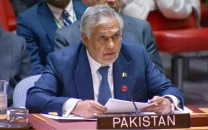Raftar CEO says PECA case filed by Balochistan Police lacks legal authority
Balochistan Police file case over documentary exposing Karachi land-grabbing network

The Balochistan Police filed a case against the management of Raftar Digital after the media outlet released a documentary exposing Karachi’s land-grabbing network allegedly backed by influential figures, including a provincial minister.
The case, registered under the Prevention of Electronic Crimes Act (PECA) at the Hub Police Station on October 4, was filed by Balochistan’s Provincial Minister Ali Hasan Brohi.
The FIR names Raftar’s CEO Farhan Malik, along with several team members. However, Malik stated that the police lack the legal authority to register such a case under PECA.
Raftar’s investigative documentary, published on September 19, shed light on systematic land encroachments and illegal property acquisitions in Karachi. The report detailed how powerful groups, allegedly operating with the support of government officials, have long profited from encroached land.
Important! Another fake case. Raftar is under the radar once again.
— Raftar (@raftardotcom) October 14, 2025
Two weeks ago, we released a documentary on Karachi’s land mafia, backed by official documents proving how these groups operate in an organized manner across the city. During production, we tried to contact every… pic.twitter.com/78tarogohH
According to Raftar, the team interviewed builders, journalists, victims, and other stakeholders to ensure a balanced account. The documentary specifically named several key figures, including Brohi, who the team said was approached for comment multiple times but did not respond.
“This raises serious concerns about procedural violations and misuse of authority, which we intend to challenge in the appropriate legal forums,” Malik said in a written statement. He added that the Raftar team has obtained protective bail from the High Court and plans to contest the case fully, asserting that the investigation adhered to all journalistic, legal, and ethical standards.
Raftar said it stands by its reporting and will continue to highlight issues of corruption, land abuse, and public accountability, despite attempts to silence independent journalism in Pakistan.
Meanwhile, following the repatriation of Afghan refugees from settlements such as Gulshan-e-Maymar’s Afghan Refugee Camp, people rushed to occupy abandoned houses and shops. Witnesses reported that as Afghan families prepared to return to their homeland, organised land mafia groups and miscreants began claiming the vacated homes.
Read More: Fresh land grab attempt at KU sparks protests
These groups spray-painted ownership marks on walls and moved in with household items. In some areas, groups—including women and children—set up barriers to block police entry, even setting fires to deter demolition teams.
However, the Malir Development Authority, police, and anti-encroachment departments have launched joint operations to reclaim state land, but these efforts often turn violent, with illegal occupants resisting demolitions and attacking law enforcement.
Another case of land grabbing involving the Karachi Development Authority (KDA) has come to light, as KDA Director General Asif Jan Siddiqui constituted a 10-member committee to investigate the alleged fraudulent transfer of a prime plot in Federal B Area.
As per details, the latest case involves plot number BS-57, measuring 400 square yards in Federal B Area, Block 7, which was allegedly disposed of by KDA officials in collusion with a powerful land mafia. Upon receiving reports of the fraud, the KDA DG took serious notice and ordered an inquiry into the matter.
Sources said the fraudulent disposal of citizens’ plots within the KDA has intensified in recent months, with several high-value properties allegedly transferred through forged documents and official connivance.
Also Read: Citizens' plots at risk amid KDA land fraud investigation
Senior KDA officials, requesting anonymity, claimed that the 'corrupt mafia' inside the institution had launched a 'clearance sale' of valuable plots, exploiting weak oversight and internal loopholes.
They warned that continued corruption and irregularities within KDA were leaving citizens’ properties increasingly vulnerable to land grabs and fraudulent allotments.
The problem cuts across all tiers of society — from encroachments on government plots and amenity spaces to illegal housing schemes marketed to low-income residents. Many of these schemes thrive on legal loopholes, overlapping land jurisdictions between provincial and federal agencies, and chronic delays in court proceedings.
Successive governments have launched anti-encroachment drives, but these efforts often stall due to political pressure or lack of continuity.
Urban planners argue that without transparent land record reforms, independent oversight, and affordable housing policies, Karachi will continue to face cycles of encroachment, eviction, and redevelopment disputes — eroding the city’s social fabric and long-term sustainability.





















COMMENTS
Comments are moderated and generally will be posted if they are on-topic and not abusive.
For more information, please see our Comments FAQ